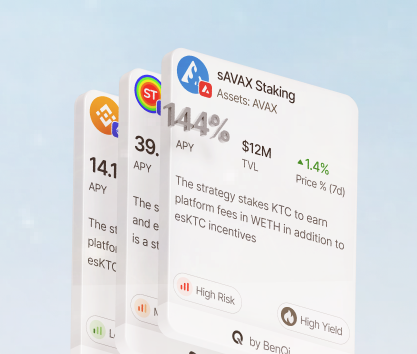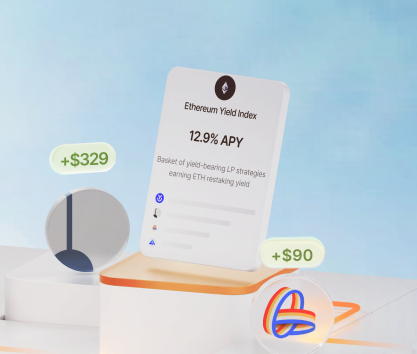The decentralized finance sector is one of the most interesting ecosystems in the blockchain industry as it offers many novel financial instruments and approaches that have never existed before. While decentralization technologies can be successfully applied to a wide range of industries including logistics, supply chains, and manufacturing, the DeFi sector seems to be the biggest and most promising of ways to put blockchain technology to good use.
The growth of the DeFi sector is more than impressive. DeFiLLama tracks over 13 thousand different active protocols that demonstrate on-chain activity in at least some capacity. There is some overlap across different categories and the number does not account for DeFi protocols that are deployed on obscure chains that are not tracked by aggregators. The number is still very large. With rates of survival in the industry being very low, many startups have already failed. For example, Cavern Protocol on Terra had decent user activity before the collapse of the network’s native token but had to be abandoned by the developer due to low adoption rates.
What is a DeFi yield farming development company?
If you try searching for one of such services on your own, you will quickly find out that the term does not have a definition set in stone with many different platforms calling their distinctly different products very similarly. Let’s talk about the ways in which this particular term can be interpreted:
- A company may be offering consultation services and help users improve their investment strategies with sound financial advice, trust management, and more. Here, providers interpret the word “development” as if it were used in the context of building and improving a portfolio.
- Some services are focused on delivering a completely different set of services like Dapp development, infrastructure maintenance, and IT. However, they do not specifically offer DeFi yield farming solutions. Likely, they simply weave these words into their marketing materials to boost SEO optimization.
- Lastly, some companies are indeed offering DeFi yield farming development services and help clients build new protocols, deploy smart contracts, and create ready-for-launch platforms that can operate autonomously.
While the vast majority of clients in this sector of the blockchain industry are either established corporations seeking new ways to improve their product lineups or crypto enthusiasts hoping to launch a new successful startup, there is more than enough room for daring investors who may be interested in utilizing capital by focusing on personalized Dapps or launching new protocols instead of investing in an existing one.
How are yield farming development services provided?
It is true that blockchain technology is not as complicated as many outsiders think it is. Early concepts were suggested back at the beginning of the 1990s but nobody was yet interested and the number of internet users was insufficient to create a strong demand for a technology focused on data distribution and governance decentralization. After the 2008 financial crisis, many tech geeks saw the potential of blockchain to completely revolutionize the world of finance.
The development is not overly complicated due to several factors:
- Smart contracts are usually written in popular coding languages like Python, C#, and Rust. For example, Solidity, use one. You can find a plethora of solutions that are ready to be deployed. These can be extremely in Ethereum, which is very reminiscent of JavaScript and has similar capabilities and Syntax. Transitioning from one language to Solidity and other chain-specific languages is not a challenging task for an experienced developer.
- GitHub is an ocean of information with templates, ready-made applications, and other useful tools freely available to every useful for anyone who wants to build something similar significantly reducing redundant development cycles.
- Many protocols publish detailed documentation and other helpful documents describing the technology helping ideas proliferate faster through the ecosystem. If you are one of the coders seeking inspiration, simply look at white papers and tech docs to check out what others have done before you.
The specifics of DeFi yield farming project development
The yield farming segment of the DeFi sector is quite massive with over 500 different protocols offering pools with rewards in native, layer-2, and other types of tokens. The combined TVL of the segment is just over $5.8 billion as of September 2024, a slight year-to-year improvement. These numbers are dwarfed by the ATH of $29 billion achieved in 2022. Nevertheless, it is still a growing ecosystem that has millions of monthly active users and robust TVL numbers suggesting a high level of investor interest.
When building a new Dapp that operates in this particular segment, several important factors must be accounted for:
- Building robust smart contracts. These tiny programs operate autonomously and ensure that transactions happen without any human intervention. While code is often very short due to size constraints, security must be taken very seriously. An insignificant vulnerability can lead to massive losses if exploited by a talented hacker.
- Focusing on user experience. The backend architecture of a Dapp plays a huge role but the frontend design may be even more important. The Pew Research Center found that over 51% of all investors are hesitant to use DeFi tools due to difficult onboarding, unfamiliar UI, and other issues that can be fixed by investing more time and effort in front-end development.
- Choosing the right chain. New startups must be aware of the advantages and disadvantages of deploying yield farming protocols on specific blockchains. For example, Ethereum gas fees and token minting costs can be quite high and become the root cause for low user activity. On the other hand, the network has the highest number of potential users. Polygon and Solana are much cheaper and have higher throughput on the layer-1 level but may not have a large enough user base.
Smart contract development for DeFi
One of the biggest reasons why many startups fail is the inadequacies in the initial design of smart contracts leading to a wide range of issues from interrupted transactions to critical exploits. Since many startups have just one shot at capturing their place in the DeFi sector, the importance of excellent smart contract design must not be underestimated. In fact, all available resources should be thrown at this particular part of the development process as other problems can be sorted out later on.
Putting the importance of audits and security in DeFi projects on the top of the list of priorities is crucial for the long-term survival of your project.
Here are the benefits of using some common techniques:
- External audits by professionals are much better than relying only on the open-source nature of development or internal quality assurance practices. In the former case, you may not have a large enough community to catch all the bugs. When trying to dedicate the team’s resources to security, you may encounter issues with the lack of appropriately trained talent or the inability to identify vulnerabilities due to familiarity with the code and the development process.
- Running bug bounty programs is extremely important during all stages of development and maintenance. For example, MakerDAO, one of the most successful decentralized protocols in the whole crypto industry, is offering $10 million if someone can identify a critical vulnerability that can lead to loss of investor funds and other similar issues. You don’t have to offer the same amount but incentivizing freelancing professionals to stress-test your platform is a good idea.
How to find a good DeFi yield farming development company in 2024?
Contemporary investors and startup founders have plentiful options as such services are offered by an incredibly large number of contractors from individual freelancers to massive corporations. Selecting a good provider of services can be a challenge even for someone with rich experience in the DeFi sector.
We want to discuss several important factors that determine the quality of services. Use some of the techniques mentioned below to identify companies that may deliver an excellent consumer experience and build you a functional decentralized application that will help you make money!
Important criteria for evaluating development companies (experience, reputation, reviews)
Focusing on social metrics when trying to find a good contractor is a good idea. Since we are living in the age of widely accessible internet, doing research is not as hard as two decades ago. You can find all the necessary information online by surfing the web or talking to active members of relevant communities on social networks like Reddit, Discord, Facebook, and Telegram.
Below are two important criteria that you should pay extra attention to:
- The team’s experience. A good track record and multiple successfully launched products form a solid resume that provides at least some assurance to potential clients. For example, Blockchain App Factory has a team of 500 employees working on 50 projects simultaneously. With over 400 deployed Dapps, it is one of the most experienced contractors in the industry.
- Gauging the reputation of a developer is quite a bit tougher. You have to search for clients of the company who experienced inadequate service, poor communication, and other problems when hiring a contractor. Since many companies simply do not publish such cases on their official websites, looking for them can be a time-consuming endeavor. Review platforms like Glassdoor and Trustpilot can be very useful.
Evaluating the technological capabilities of a development team
A provider must have a large enough team to work on multiple projects simultaneously with many of them designed for specific blockchains. In many cases, it is a good idea to work with specialized development teams that have experience working with specific chains that you want to target. While Solidity seems like a relatively simple language that can be picked up by any developer, the Ethereum ecosystem has some unique quirks that developers who are unfamiliar with the network will spend way more time figuring out.
The same can be said about any other blockchain network. Polygon, Base, Solana, Binance Smart Chain, and many others have unique technological challenges and standards.
The future of blockchain development for yield farming
The data on user activity in the DeFi sector is unreliable with different sources reporting figures that have massive discrepancies. For example, the on-chain analytics application on Dune says that the number of active wallet addresses in the ecosystem has risen to 86 million which is a 230% increase year-on-year. The number of monthly active wallets has grown to 16 million with an even higher 316% growth.
At the same time, Statista claims that the number of actual users has gone down throughout the last three years after peaking at 8 million in 2022. TVL figures also suggest an overall decline. However, the shift in TVL compositions indicates that the industry is maturing with many accidental users leaving. For instance, many protocols have seen a sharp decline in stablecoin holdings and a rise in ETH holdings.
The number of DeFi protocols is also growing steadily. While many tracked platforms do not have any monthly activity, the majority of them do. With just the category of DEXes and yield farming projects containing over 2,000 different protocols, it is easy to see why so many investors and financial institutions are interested in making their move and joining the sector.
Examples of successful DeFi projects and companies that developed them
There are many unique platforms that have emerged thanks to the existence of Dapp development teams that offer their services to corporate and individual clients. We want to give you a glimpse at the world of protocols designed by established providers:
- RadioShack’s NFT marketplace which works with a variety of digital assets and creates a strong brand image associated with forward-thinking development and advanced technology is a great example of a product from a corporation that wants to freshen up its public appearance. The marketplace was created by Blockchain App Factory.
- CoinTrade is a crypto trading platform that offers a wide range of different products to thousands of monthly active users. It has an on-chain portfolio tracker, passive investment tools, and other interesting features. Some of the work on the platform was done by Antier Solutions, an experienced development company.
The main takeaway
Whether you want to launch a personalized Dapp to invest in the sector directly and offer such opportunities to other users or find a solution for a business, the current landscape of the blockchain industry has you covered. Investors must remember one of the main risks when dealing with DeFi solutions: insufficient or inadequate security measures. If you find a responsible developer, deploying a useful Dapp won’t be a problem!









